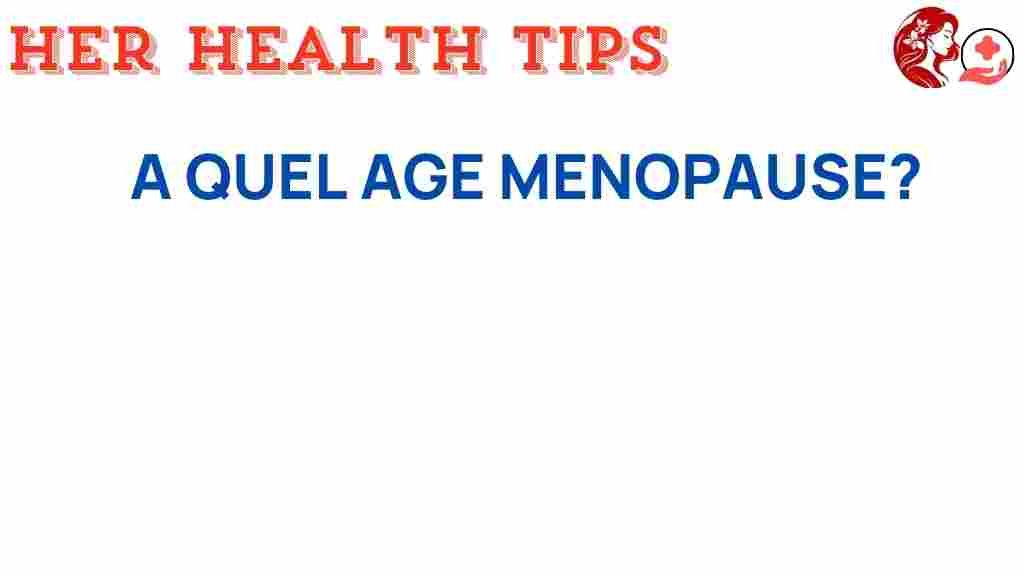Unraveling the Mystery: What Age Does Menopause Begin?
Menopause is a natural biological process marking the end of a woman’s reproductive years. It is a significant phase in women’s health that involves various hormonal changes and symptoms. Understanding the age of onset for menopause is essential for women as they approach midlife transitions. In this article, we will delve into what menopause is, its symptoms, the typical age at which it begins, and how women can manage this transition effectively.
Understanding Menopause and Its Importance
Menopause signifies the cessation of menstrual cycles, diagnosed after a woman has gone 12 months without a period. This transition is a crucial aspect of women’s reproductive health, typically occurring between the ages of 45 and 55. However, the age of onset can vary significantly from one woman to another, influenced by various factors.
The Stages of Menopause
Menopause is not an instantaneous event but rather a process that unfolds in stages:
- Perimenopause: This is the transitional phase leading up to menopause, which can last several years. During this time, hormonal fluctuations may cause irregular periods and various symptoms.
- Menopause: This is the point when a woman has gone 12 consecutive months without a menstrual period.
- Postmenopause: This phase occurs after menopause and lasts for the rest of a woman’s life. Symptoms may continue but generally diminish over time.
The Age of Onset: When Does Menopause Begin?
The average age of onset for menopause is around 51 years old. However, this can vary widely. Some women may experience menopause as early as their mid-30s, while others may not reach it until their late 50s. Several factors can influence when menopause begins:
- Genetics: Family history plays a significant role. If your mother experienced early menopause, you might too.
- Health Conditions: Certain medical conditions, such as autoimmune diseases or thyroid disorders, can affect the timing of menopause.
- Lifestyle Factors: Smoking and other lifestyle choices can lead to an earlier onset of menopause.
- Surgical Factors: Women who undergo a hysterectomy or oophorectomy may experience menopause at a younger age.
Symptoms of Menopause
As women approach menopause, they may experience a range of symptoms due to hormonal changes. These can include:
- Hot flashes: Sudden feelings of warmth, often accompanied by sweating.
- Night sweats: Hot flashes that occur during sleep and can disrupt rest.
- Irregular periods: Changes in menstrual cycle frequency and flow.
- Sleep disturbances: Difficulty falling or staying asleep.
- Mood swings: Increased irritability, anxiety, or depression.
- Vaginal dryness: Decreased estrogen can lead to dryness and discomfort during intercourse.
These symptoms can vary in intensity and duration, making it important for women to be aware of their reproductive health as they approach this midlife transition.
Managing the Midlife Transition
While menopause is a natural process, the symptoms can be challenging. Here are some strategies to manage this transition effectively:
- Healthy Diet: A balanced diet rich in fruits, vegetables, whole grains, and lean proteins can help manage symptoms and promote overall health.
- Regular Exercise: Physical activity can reduce hot flashes and improve mood, making it a crucial component of women’s health during menopause.
- Stress Management: Techniques such as yoga, meditation, and deep-breathing exercises can help mitigate mood swings and anxiety.
- Hormone Replacement Therapy (HRT): For some women, HRT can alleviate severe symptoms. It’s essential to discuss the benefits and risks with a healthcare provider.
- Consult a Specialist: Regular check-ups with a doctor who specializes in women’s health can provide personalized advice and treatment options.
Health Awareness and Education
Awareness and education about menopause are crucial for women navigating this stage. Understanding the hormonal changes and the age of onset can empower women to take charge of their health. Resources such as Menopause.org and local health workshops can provide valuable information and support.
Common Questions about Menopause
What triggers menopause?
Menopause is primarily triggered by a natural decline in the production of hormones like estrogen and progesterone in the ovaries. Other factors, such as genetics, medical conditions, and surgical procedures, can also play a role.
Can menopause be delayed?
While menopause is a natural process, certain lifestyle changes may help delay its onset. Maintaining a healthy weight, not smoking, and managing stress can contribute to a smoother transition. However, genetics largely determine the age of onset.
Are there risks associated with menopause?
Yes, menopause can increase the risk of certain health issues, including osteoporosis and heart disease, due to lower estrogen levels. Regular health screenings and lifestyle modifications can help mitigate these risks.
Troubleshooting Tips for Managing Symptoms
While the transition into menopause can be daunting, there are practical tips to help alleviate symptoms:
- Stay Hydrated: Drinking plenty of water can help manage hot flashes and reduce vaginal dryness.
- Dress in Layers: Wearing breathable fabrics and layers can help you adjust to temperature changes that come with hot flashes.
- Limit Caffeine and Alcohol: Reducing these substances can minimize the severity of symptoms.
- Use a Lubricant: Over-the-counter vaginal lubricants can help alleviate discomfort during intercourse.
Conclusion
Menopause is a natural phase in a woman’s life that typically occurs between the ages of 45 and 55. Understanding the age of onset, symptoms, and management strategies can empower women to navigate this midlife transition with confidence. By prioritizing women’s health and staying informed about hormonal changes, women can enhance their quality of life during and after menopause. Remember, seeking support from healthcare professionals and utilizing available resources is key to successfully managing this transition. For more information on menopause and women’s health, consider visiting CDC’s women’s health page.
This article is in the category Reproductive and created by HerHealthTips Team
